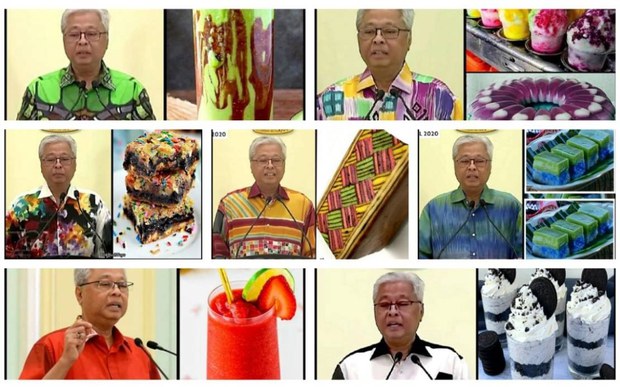Ismail Sabri Yaakob: Malaysia’s New PM has Fondness for Batik Shirts
2021.08.20
Washington
 A collection of memes on Ismail Sabri Yaakob’s fondness for batik-print shirts is seen on the soon-to-be prime minister’s Facebook page, May 1, 2020.
A collection of memes on Ismail Sabri Yaakob’s fondness for batik-print shirts is seen on the soon-to-be prime minister’s Facebook page, May 1, 2020.
Until the king named him Malaysia’s new prime minister, Ismail Sabri Yaakob had the dubious distinction of being the country’s shortest-serving deputy PM – albeit one with an enviable closet of batik-print shirts.
A local Malaysian daily, the Malay Mail, also called him “arguably the country’s most unexpected prime minister to date,” because until now, anyone from the United Malays National Organization who has become PM has also been the party’s leader.
But with the UMNO president battling a corruption case in court and with the party’s deputy president not being a member of parliament, the party chose its vice president, Ismail Sabri, to be its nominee for the top job in government.
The 61-year-old veteran politician was seen as amenable to a majority of lawmakers, who named him as their choice for prime minister when the king sought their nominations. And on Friday, the king appointed him Malaysia’s ninth prime minister.
Undefeated MP from Bera since 2004
Ismail Sabri, who Malaysians affectionately called “pak long,” or “eldest uncle,” hails from Temerloh in the eastern state of Pahang, from where the current king and former PM Najib Razak also hail.
Ismail Sabri started his career as a lawyer in 1985 and was first elected as an UMNO MP in 2004 from the then-newly created Malay-majority constituency of Bera in Pahang. He has been re-elected from there ever since.
His first cabinet appointment came in 2008 when then-Prime Minister Abdullah Badawi appointed him Minister for Youth and Sports. He held various cabinet positions in UMNO governments after that, including as minister for Domestic Trade, and Agriculture and Agro-based Industry.
After UMNO suffered a shock defeat in the 2018 elections, Ismail Sabri was elected one of three party vice presidents – he got the largest number of votes of the three. Analysts said this reflected his popularity with the party rank-and-file.
According to the Malay Mail, one of Ismail Sabri’s top notable initiatives was his 2014-2015 work to rid farmers of middlemen. He called it a “jihad against the middlemen.”
But there have been blots on his career too.
In February 2015, when he served as Agriculture and Agro-based minister, he urged ethnic Malays to boycott Malaysian Chinese businesses, in a now-deleted Facebook post. He claimed that Malaysian Chinese monopolized businesses and discriminated against non-Chinese entrepreneurs, local media said at the time.
That same year, Ismail Sabri pushed to launch a mall exclusively for Malay traders to sell digital devices, which ended up a failure, according to analysts.
In the run-up to the 2018 elections, he warned that every vote for the opposition coalition would eliminate ethnic Malays’ rights and special privileges – this angered Malays as well. Special rights and privileges for the Malay Muslim majority are woven into Malaysia’s constitution.

He came back as cabinet minister in 2020 under his predecessor Muhyiddin Yassin’s administration. He was named defense minister and was the official put in charge of handling several key aspects of the COVID-19 pandemic.
Many Malaysians have criticized the Muhyiddin government – especially Ismail Sabri – for what they said were confusing lockdown protocols. During a so-called strict lockdown imposed on June 1, more than a dozen manufacturing sectors were allowed to keep operating at 60 percent capacity, which many cited as the reason for a huge surge in COVID-19 infections.
Still, Ismail Sabri became a very familiar face to Malaysians as he appeared on their TV screens for daily – and then thrice weekly – pandemic-related press conferences.
That is when the country noticed his penchant for batik shirts. Memes about his colorful shirts – said to be designed by his son-in-law, fashion designer Jovian Mandagie – went viral on social media, with people comparing them to food and drink.
Ismail Sabri took it in good spirit and even posted some on his Facebook page.
“Net citizens are really creative. My clothes have become cakes. I thought I was just a Malaysian batik model. Apparently I became a model of cake and ice cream,” he wrote.
“Thank you net people for entertaining [not just me] me but all Malaysians.”
S. Adie Zul contributed to this report from Kuala Lumpur.







